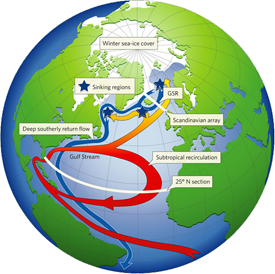
Still following me? Good, because it seems that this theory could play out in Europe. According to researchers at the Royal Netherlands Institute of Sea Research, there is a 7,500 cubic kilometer pool of fresh water in the Arctic Ocean. This pool of fresh water could lead to a disruption of the gulf stream, which would lead to cooler temperatures in parts of Europe and North America.
Sea ice is melting quicker. It is thinner and more mobile, and could exit the Arctic faster. Also more of it will enter the Atlantic as liquid water rather than ice.
If the gulf stream were slowed, interrupted or otherwise hindered in any way, the result would be cooler year-round temperatures. The question would then become one of “how drastic,” and that question is a much harder one to answer.
 Gearfuse Technology, Science, Culture & More
Gearfuse Technology, Science, Culture & More


